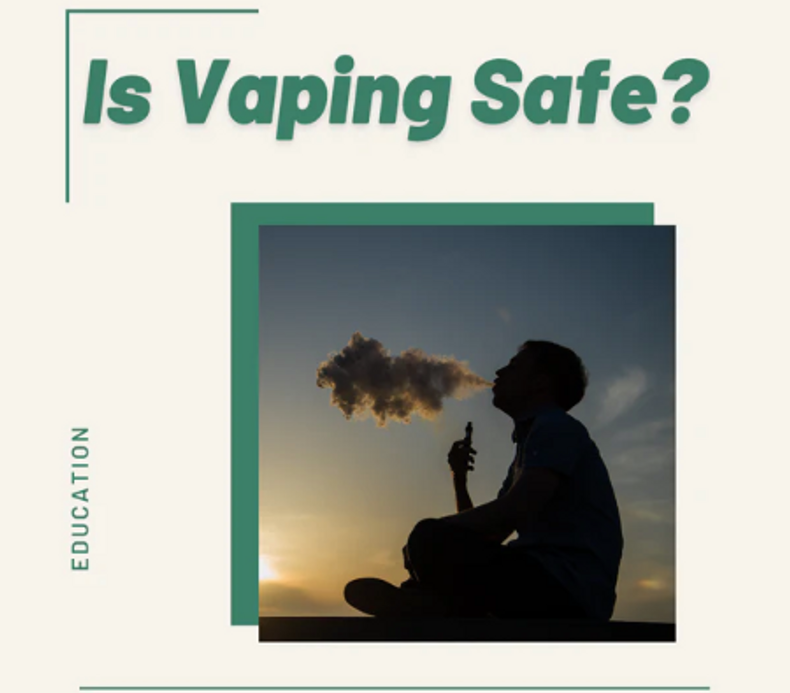
Is Vaping Safe?
As many of us are aware, there is a nationwide scare in the news surrounding the topic of vaping. Vaping is defined as, “The heating of a liquid to produce an aerosol that usually contains nicotine, flavoring, and other chemicals that users inhale” [1]. We're here to answer your questions, most importantly, is it safe?
Why Quality is Compromised
Initially, the purpose of vaping was to provide a healthier alternative to smoking cigarettes, as well as a more convenient and covert way to consume marijuana. Vaping has evolved at a rampant rate and has created lots of revenue for tobacco and cannabis industries. With an oversaturated market, quality and purity of products are being compromised. The risk for toxic vaping products in the black market has dramatically increased.The majority of vaping illnesses and deaths in today’s news are being directly related to black market vaping products.
There have been 6 reported deaths and over 450 reported cases of acute lung injuries across 33 states recently [1]. These illnesses and deaths have created a media frenzy. The population has came to a generalized consensus that all vaping is unhealthy and potentially life threatening. Much of this fear and confusion comes from a lack of education surrounding vaping. Fear not! We are here to ease your mind with the information below.
Not All Vape Products Are Bad!
The most important thing to know is that not all vape products and accessories are created equal. It is vital to read the ingredient labels of a vape cartridge or vape juice. It is highly recommended to stay away from ingredients such as:
- Propylene Glycol (PG)
- Polyethylene Glycol (PEG-20,400)
- Artificial Flavoring and Artifical Terpenes
- Vitamin E Acetate.
These ingredients are common additives used as cutting or thinning agents in cannabis oil and nicotine e-juice vaporizers. When heated to approximately 446 degrees Fahrenheit, PG and PEG can be converted into carcinogenic compounds such as Formaldehyde and Acetaldehyde [2]. Scientists at the Medical Marijuana Research Institute in Arizona found, “Formaldehyde inhalation has been linked to increased incidence of myeloid leukemia and nasopharyngeal cancer” [2]. Aldehydes irritate airways and compromise health. We advise everyone to avoid them when possible.
Be Wary of Products without Ingredient Labels
When products do not contain labels at all, like those found on the black market, it's best to stay away. Currently, the most common illness that doctors link to vaping is known as “Acute Lipoid Pneumonia”, which is defined as, “pneumonia caused by aspiration of oil-based substances” [5]. This illness, among others that are being linked to vaping, are being traced to products sold on the black market. Scientists have identified that inhaling oil based substances such as Vitamin E acetate and artificial flavorings/artificial terpenes are responsible for these illnesses [4]. The safety of these oils has never been tested for inhalation and has only been regarded as safe for ingestion or topical use, therefore, we recommend opting for a product that steers clear of these ingredients.
Responsible manufacturers and vendors of vape products should always be able to provide a COA (Certificate of Analysis) from a third party laboratory, which tests for potency, heavy metals, residual solvents, contaminants, pesticides, microbials, mycotoxins and foreign matter. It is also highly recommended to find a single source product where the production can be traced from seed to shelf. (A single source product from a reputable manufacturer generally ensures a cleaner and much higher quality end product).
The Happy Trails Goal
At Happy Trails, it is our goal to provide customers with high quality products from reputable manufacturers that can be traced from seed to shelf and are all equipped with a COA. In relation to our vape products, we make it a point to provide options that have minimal ingredients, with properly extracted CBD oil, naturally derived terpenes, and carrier oils such as MCT oil and vegetable glycerin, which are considered safe to vape [2]. We also recommend inquiring about the cannabinoid to carrier oil ratio. Carrier oils, such as MCT and vegetable glycerin, act as a vehicle of delivery and prevent crystallization. When less of a carrier oil is being used, the product is more potent and pure. Inquire about the milligram dosage of CBD in your vape product of choice to better determine the cannabinoid to carrier oil ratio.
The Happy Trails Promise
The overall safety of vaping is still up for debate.However, Happy Trails ensures that all of the products we offer are of the highest quality, third-party lab tested for potency and purity, can be traced from seed to shelf, and have been personally tested for safety and effectiveness by our employees. As always, please feel free to reach out to us via e-mail, social media or by phone at any of ourlocationsand we will be happy to answer any questions you may have.
References:
[1] “Outbreak of Electronic-Cigarette–Associated Acute Lipoid Pneumonia – North Carolina, July–August 2019 | MMWR.”Centers for Disease Control and Prevention, Centers for Disease Control and Prevention, 13 Sept. 2019,https://www.cdc.gov/mmwr/volumes/68/wr/mm6836e1.htm.
[2] “Carbonyl Compounds Produced by Vaporizing Cannabis Oil Thinning Agents.” Journal of Alternative and Complementary Medicine (New York, N.Y.), U.S. National Library of Medicine, 29 Mar. 2017,https://www.ncbi.nlm.nih.gov/pubmed/28355118.
[3] “How Safe Is Your Vape Pen?” Project CBD: Medical Marijuana & Cannabinoid Science, 14 July 2015,https://www.projectcbd.org/industry/how-safe-your-vape-pen.
[4] “Special Report: Cannabis Researchers, Scientists Confront Vaping-Related Lung Disease Debate.”Cannabis Business Times, Cannabis Business Times, 10 Sept. 2019,https://www.cannabisbusinesstimes.com/article/vaping-lung-disease-science-vitamin-e-acetate-terpenes-questions.
[5] “Study of Acute Exogenous Lipoid Pneumonia.”Indian Journal of Pediatrics, U.S. National Library of Medicine, Aug. 2016,https://www.ncbi.nlm.nih.gov/pubmed/26821544.

